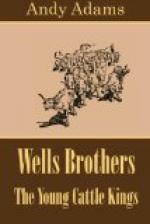A cyclone cellar served as a storeroom for the sacked corn. Joel was away by early sun-up, on the second trip to the station, while those left behind busied themselves in strengthening the commissary. The barrels were made sweet and clean with scalding water, knives were ground, and a crude platform erected for cooling out meat. Dell, on the tip-toe of expectancy, danced attendance, wondering how this quiet man would accomplish his ends, and unable to wholly restrain his curiosity.
“Watch me closely,” was the usual reply. “You will probably marry young, and every head of a family, on a ranch, ought to know how to cure corn beef. Give me a week of frosty nights, and the lesson is yours. Watch me closely.”
The climax of the day was felling the beef. Near the middle of the afternoon, the two rode out, cut off a small contingent of cattle, including the animal wanted, and quietly drifted them down to the desired location. Dell’s curiosity had given way to alertness, and when the old foreman shook out a rope, the boy instinctively knew that a moment of action was at hand. Without in the least alarming the other cattle, the cast was made, the loop opened in mid-air, settled around the horns, cut fast by a jerk of the rope, and the contest between man and animal began. It was over in a moment. The shade of a willow was the chosen spot, and as the cattle were freed, the steer turned, the horseman taking one side of the tree and the beef the other, wrapping several turns of the rope in circling on contrary courses. The instant the big fellow quieted, on its coming to a level, a pistol flashed, and the beef fell in his tracks. That was the programme—to make the kill in the shade of the willow. And it was so easily done.
“That’s about all we can do on horseback,” said the gray-haired Texan, dismounting. “You may bring the knives.”
Every step in the lesson was of interest to Dell. Before dark the beef was cut into suitable pieces and spread on the platform to drain and cool. During the frosty night following, all trace of animal heat passed away, and before sunrise the meat was salted into barrels. Thereafter, or until it was drained of every animal impurity, the beef was spread on the platform nightly, the brine boiled and skimmed, until a perfect pickle was secured. It was a matter of a week’s concern, adding to the commissary two barrels of prime corned beef, an item of no small value in the line of sustenance.
The roping of the beef had not been overlooked. “I can’t see what made the loop open for you yesterday,” said Dell the next morning; “it won’t open for me.”
Priest took the rope from the boy. “What the tail means to a kite, or the feather to an arrow,” said he, running out an oval noose, “the same principle applies to open the loop of a rope. The oval must have a heavy side, which you get by letting the Hondo run almost halfway round the loop, or double on one side. Then when you make your cast, the light side will follow the heavy, and your loop will open. In other words, what the feather is to the arrow, the light side is to the heavy, and if you throw with force, the loop must open.”




